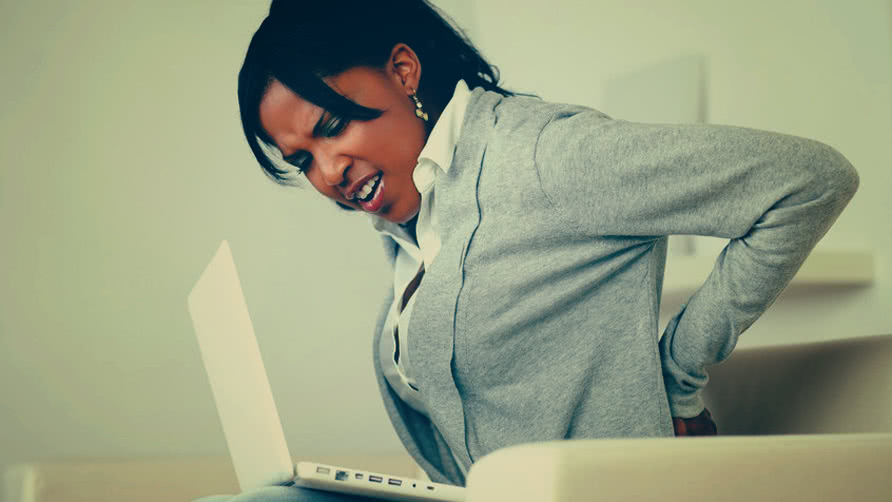Severe lower back pain is becoming a big problem for Nigerian professionals. A recent study by Omoke et al (2016), on lower back pain in Nigeria showed the predominance of mechanical lower back pain of 82.1% (of all reported back pains). This article reviews the leading causes of back pain and how to avoid them.
Peter is a 47-year-old process engineer in one of the oil companies in Nigeria. To beat the numerous deadlines and to be able to communicate with his team members in different time zones, he is usually in the office before 7 a.m. and rarely leaves before 9 pm.
In the past year or so, Peter started feeling a tinge of pain in his back which he attributed to malaria and stress at work. This low-grade back pain will usually resolve after using painkillers. Then one day, after working for about three hours, he couldn’t stand up because his back had literally frozen. Every movement triggered a torrent of excruciating pain. The first thing he thought of was that he had been paralysed through a spiritual attack from the village or competitors in the office. It never occurred to him that years of sitting glued to the desk and computer screen was slowly damaging his back.
Also Read: Medical Tourism: Nigerians Turn to Egyptian Hospitals for Correction of Failed Surgeries Done in Nigerian Hospitals
Lower back pain is getting to epidemic levels amongst Nigerian professionals. There are different causes of severe lower back pain, but the sort that strikes most in Nigerian offices is mechanical back pain which is the term that refers to any type of back pain caused by placing abnormal stress and strain on the muscles of the spine. It usually results from bad habits such as prolonged hours of static sitting with poor posture, wrong ergonomics (i.e. wrong computer placement relative to the office chair and desk position), poor back support office chairs, lack of exercise and obesity. Peter the Process Engineer was eventually diagnosed with mechanical back pain, the type that afflicts a lot of professionals in Nigeria.
A recent study by Omoke et al (2016), on lower back pain in Nigeria showed the predominance of mechanical lower back pain of 82.1% (of all reported back pains). This figure is very similar to the 80-90% already documented in the developed world. Omoke and his team found that there is no significant gender bias in mechanical back pain, so women are as affected as men. Mechanical back pain affects many professionals by the time they are 45 years old, i.e. roughly after 20 years of starting their careers. The authors note that farmers do not start to experience lower back pain until around 65 years of age, evidence of the stress sitting still at desks inflicts on our backs.
A recent study by Omoke et al (2016), on lower back pain in Nigeria showed the predominance of mechanical lower back pain of 82.1% (of all reported back pains). This figure is very similar to the 80-90% already documented in the developed world.
Also Read: Office Lives: Abiola Adekoya, CEO and Founder of Artios Capital
What to Do When Mechanical Back Pain Strikes

- Years ago, the advice given to patients with lower back pain was to go on bed rest. This advice has been shown to be counter-productive as bed rest will only make the already weak back muscles weaker. Exercising has helped a lot of patients overcome their lower back pain. Swimming and walking are two highly-recommended exercises to tackle back pain.
- Even if it feels you are almost paralysed, exercising reduces your pain in a few days. Unscrupulous clinics can sometimes capitalise in your fears and recommend expensive but unnecessary treatments.
- Herbal treatments work but are ultimately unreliable. Don’t rely on herbal concoctions (there’s a popular variant called “opa –eyin”). They may provide relief but the danger is that you will keep damaging your back with bad sitting and working habits if you don’t see a physiotherapist that can advise you on how to manage your back and reduce the stress that is causing the back pain
My next piece will discuss working habits that help you avoid mechanical back pain.

Nkiru Jibuaku has practised as a physiotherapist for 18 years in both Nigeria and the United Kingdom.

